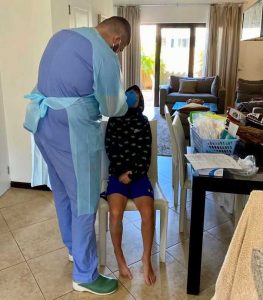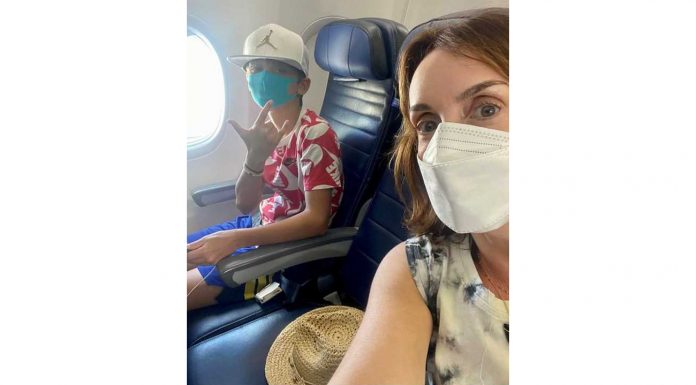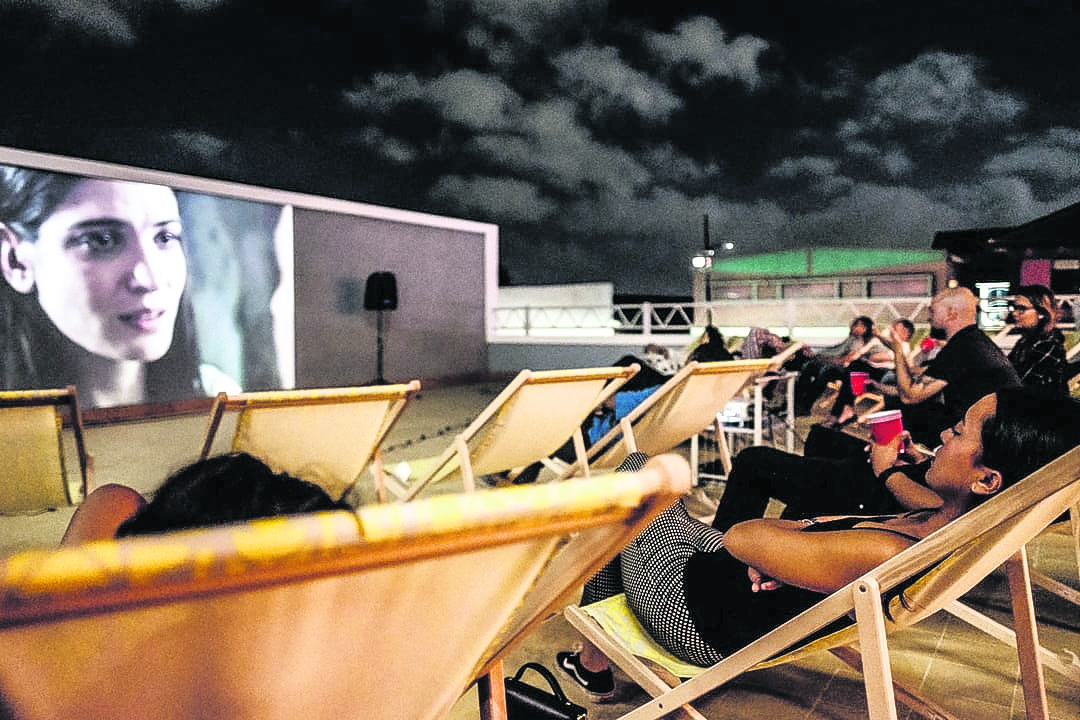By Shawna Cohen
Days before Omicron makes national headlines, I book my family of four a last-minute getaway to Aruba. Life is returning to normal; we can finally dine indoors and the hair salon is no longer considered a Petri dish of bacteria. The kids are back in school. Face-to-face meetings aren’t taboo. People are wearing pants!
There’s the guilt factor, too. Our kids, ages 16 and 12, have missed so many milestones, so much normalcy, that we’re compensating for lost time. The last time my youngest had a full year of school, he was in Grade 4. He’s now in junior high. My oldest feels robbed of his high school years, and rightfully so.
“It’s too much of a risk,” my husband tells me in mid-December, just days before departure. He’s referring to COVID, of course. What if one of us gets sick there? Is this the responsible time to be travelling? Truth be told, I’d grappled with the same decision. We’ve been strong believers in masks and vaccines since day one. Our entire family has followed the rules. After much deliberation, we decide to go for it. We’ve already paid for flights and a time-share — more important, we need it for our mental health. I try on old swimsuits and purchase the perfect beach read (“Mary Jane” by Jessica Anya Blau).

We arrive and have five blissful days on the beach. Morning walks before breakfast. Afternoons playing football in the warm Caribbean Sea and strolling along the shoreline to meet friends. Dinners are always al fresco. My boys are off their screens for hours at a time — no negotiation required.
Then, on day six, my younger son, Isaac, tests positive for COVID.
I’m worried about his health, first and foremost, but also how we’ll get home and if we’ll catch it from him. I’m also concerned about where we’ll be required to quarantine. I’m imagining Toronto’s government-approved quarantine hotels of months past, where air travellers were required to isolate, to the tune of $3,000, while awaiting negative COVID test results. Reports were dire: waiting up to a full day for inedible food, no access to luggage, lack of diapers for children. Some claimed it’s where you’d go to get COVID (outbreaks were common). A New York Times reporter likened it to doing time at a “Canadian Alcatraz.”
Google can’t calm my nerves. There’s little information about where COVID-positive visitors go. “Guests will be transported to a designated isolation location,” reads the Aruba Tourism Authority website. Discussion groups on TripAdvisor are equally vague.
The next 24-plus hours are spent in isolation. We order in meals and hang out on the balcony. Things could be worse: I’ve got snacks and the third season of “Succession” on my iPad. Most important, Isaac continues to be asymptomatic — a huge relief. The following morning, my husband and older son fly home. We are all due to check out of our time-share that day, but the front desk staff are reassuring: “Stay as long as you need,” they tell me. “We’ll give you a ‘distress rate,’ which is the lowest rate possible. Can I drop anything off? Are you hungry?”
Finally, 36 hours after the positive test result, I get a call from Aruba’s department of public health. The lovely woman on the phone asks if we’re OK, tells me how sorry she is that our vacation has been cut short. I feel like I’m speaking to a family member. She informs me that a “private concierge” will be in touch to arrange relocation, as well as a doctor, but I should reach out if there’s anything I need before then. Because Isaac is asymptomatic, our quarantine will last for seven days rather than 10.
Moments later, a message from “Private Concierge Nicole” pops up on my WhatsApp. She informs me she has a two-bedroom apartment available and what time would we like to be picked up? Is 2 p.m. convenient? The accommodation and transfer are included in Aruba Visitors Insurance, she tells us, then sends links to restaurants that deliver in the area. She even shares the name of a grocery delivery guy. I am slowly falling in love with Nicole.
The phone rings. It’s Dr. Bakker, from MedCare, who asks how Isaac’s feeling and just as important, “How are you? No, really, how are YOU?” I want to lie on the couch and tell her about my childhood. She gives me her number and says to call or text any time.
Later that afternoon, a van comes to pick us up. A large security guard knocks on the door, hands us N95 masks and plastic gloves, and takes our suitcases. We follow him and a bellhop down the hallway, as a hotel employee fumigates behind us. It’s a full-on COVID walk of shame.
Our driver, Alan, is friendly and warm. “It’s going to be OK, buddy,” he tells Isaac more than once. I thank him for putting his own health at risk to drive us to this secret location. “We’re all in this together,” he says wistfully.
Another WhatsApp comes in. This time it’s from the property manager of our new digs. She’s sorry we have to meet under these conditions — her daughter just tested positive, so she understands the stress — but is here to make our stay as enjoyable as possible. She, too, sends me a thorough list of nearby restaurants and the name of another grocery delivery guy. At this point, I feel like I’m either being pranked or perhaps have unknowingly paid for VIP service somewhere along my blindly-filling-out-forms journey.
We finally arrive at our “designated isolation location.”
It’s not an apartment but rather a spacious and modern two-storey townhouse in a gated community. There’s a full kitchen, washing machine and dryer, Wi-Fi, Netflix. My king bed has a firm mattress, crisp white sheets and nearly a dozen pillows. Have I mentioned the back patio with barbecue? I lose Isaac for a few minutes but eventually find him in the kitchen, hunched over a welcome basket of Frito-Lays and Snickers. “I’m living my best life,” he says, deadpan, and disappears to his bedroom to watch basketball on TV.
The next five days are a breeze. Concerned friends check in, certain I’m in COVID jail (a video tour of our digs alleviates any fear). Dr. Bakker calls to check in. Two public-health nurses stop by on our second-last day with an official letter of recovery for Isaac. A separate public health worker drops off meds (unrelated to COVID) and we chat for a while out front. He tells me COVID numbers are going up and they’re running out of places to house people; visitors are now welcome to stay put at their hotel/time-share/Airbnb so long as they isolate (insurance covers the cost). I tell him how I lucky I feel to have been placed in this beautiful home and he explains that all government-appointed accommodations meet this high level of comfort and luxury. In fact, he can’t understand why someone would be “punished,” or treated poorly, for contracting COVID. “We’re all human,” he says, then asks if I need more groceries or wine.
How to get home.
My only source of stress — and it’s a big one — is figuring out how to get home. Our week of quarantine is about to end but we cannot board a plane to Canada until at least 14 days have passed since Isaac tested positive. The CDC, meanwhile, has changed U.S. quarantine to five days. Following many phone calls and much research, I find a loophole: fly from Aruba to Buffalo via Newark and drive across the border from there. If you’re a Canadian citizen, you cannot be turned away at the border (you may, however, be subject to a $5,000 fine). At the end of the day, there’s nothing illegal about taking this route.
My other option is to spend another week in Aruba until the 14 days have passed, but I’m worried I’ll contract COVID while waiting it out (numbers are rising quickly). Also, I haven’t budgeted for an extra two weeks away and I need to get back to work. I consult with a couple of doctors to ensure we won’t be putting other people on our flight at risk; they assure me that Isaac is no longer contagious.
Our 16-hour travel odyssey begins. We leave for the airport at noon, land in Newark at 10 p.m. and finally in Buffalo close to midnight. I fill out the ArriveCAN app and wait in line for an express PCR test at the Buffalo airport because I’m told my negative PCR test from Aruba won’t cut it at customs. We get to the Canadian border and show our documents, are told to pull over to discuss a quarantine plan. A customs agent knocks on the car window and tells me to expect a call on my cell. I’m confused but don’t dare ask questions; this man is not interested in talking.
Twenty minutes later, a call comes in from Ottawa Public Health. An agent tells me the border is short-staffed and that he’s “the first line of defence.” He asks me dozens of questions about where we’ll quarantine, if we’ll have access to food and medicine. He then tells me the clock has reset: I’m to quarantine at home for 14 days, Isaac for 10, upon entry. I ask why, given that I’ve tested negative and that we’ve already spent seven days in quarantine (for those keeping track, that’ll be 21 days total for non-COVID me). He laughs at the absurdity of it all.
Incidentally, newspapers are reporting that same day that Canada is following CDC guidelines and has lowered its quarantine period to five days. The Ottawa Public Health man admits there’s lots of confusion within public health about the new rules. Finally, he says that an agent will return to my car with two PCR tests each for Isaac and me, to be self-administered on days 1 and 8. I ask why they’d waste two covetable tests on Isaac, given that we know he’ll test positive (antibodies can stay in your system for up to six months). Again, he’s not sure. I can tell by his tone he’s as dumbfounded as I am; he’s just doing his job.
Eight long days after returning home, I receive an email from Switch Health with our COVID results. Isaac has tested positive. Toronto Public Health sends an automated text: “We’re asking you to complete an assessment form to help slow the spread of COVID.” I reluctantly comply, offering details of our quarantine plan. Hours later, they call to alert me of Isaac’s positive COVID test; we must discuss a quarantine plan! “Isaac first tested positive 16 days ago,” I explain. The agent sounds genuinely surprised. “My manager will call you over the weekend,” she says. This woman is no doubt one of thousands of tired and overworked public-health workers, repeating guidelines from yesterday that are no longer relevant, seeming to shrug their shoulders at the logic of it all (or lack thereof). I don’t blame them but rather the labyrinth of confusing rules and quasi-regulations set out by the province. It has destroyed whatever sense of community we once had.
Here’s what I’ve learned:
In Canada, citizens are made to feel like criminals for travelling. If they contract COVID while home or abroad, it’s nearly impossible to know who to call for clear answers as the rules seem to change every day. In Aruba, visitors are connected to public-health workers, doctors and nurses who are knowledgeable and eager to help. This little island takes a compassionate and common-sense approach to keeping its visitors — and residents — feeling safe. They’ve proven that in the fight against COVID, humanity wins. When numbers are down and it’s once again safe to travel, my family cannot wait to return.




















